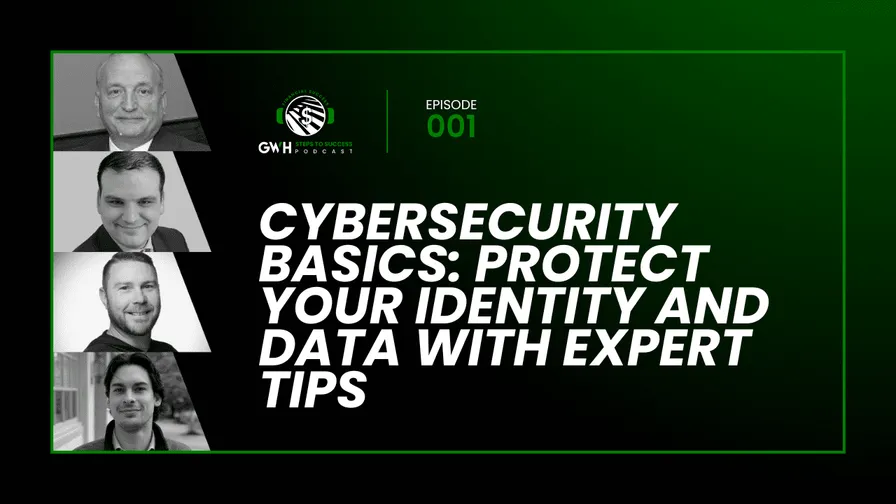
Cybersecurity Basics: Protect Your Identity and Data with Expert Tips
About This Episode
Welcome to the GWH Steps to Success Podcast! In this episode, join Chris Cice, Mike Cice, and special guest Riley Masterson as we dive deep into the world of cybersecurity. Whether you’re a tech novice or a seasoned pro, protecting your personal information online is more crucial than ever. With cyber threats on the rise, our discussion covers essential tips and strategies to keep you and your loved ones safe in the digital age.
Understanding Cybersecurity Misconceptions
One of the biggest misconceptions about cybersecurity is that only wealthy or high‑profile individuals are targeted by hackers. In reality, everyone is a potential target. Hackers can steal your identity, Social Security number, and bank account information, causing significant financial and emotional distress. It’s vital for everyone to have a plan in place to protect themselves from these threats.
Top Three Habits for Better Cybersecurity
-
Use Strong, Unique Passwords
Use a password manager like LastPass to generate and store complex passwords. This way, you only need to remember one master password. -
Enable Two‑Factor Authentication (2FA)
This adds an extra layer of security by requiring a second form of verification—such as a text message or authentication app—before accessing your accounts. -
Limit Personal Information on Social Media
Be cautious about sharing personal details like your birthday, address, and school information online. Hackers can use this data to guess passwords or answer security questions.
Latest Scams and Threats
Cyber threats are constantly evolving. Recently, a massive breach at a Florida‑based background‑check company exposed 272 million Social Security numbers. Additionally, hackers are using artificial intelligence to mimic voices and trick individuals into sending money. Phishing scams, where hackers send fake emails to steal personal information, are also prevalent. Always be cautious and verify the authenticity of any unexpected communication.
Protecting Your Mobile Devices
Mobile devices are increasingly used for banking and other sensitive activities. To secure your devices:
- Use a VPN (Virtual Private Network) to create a private connection, especially when using public Wi‑Fi.
- Be mindful of app permissions and avoid granting unnecessary access to your personal data.
The Importance of Locking Your Credit Reports
Given the widespread availability of stolen Social Security numbers, it’s essential to lock your credit reports. This prevents unauthorized accounts from being opened in your name. Services like LifeLock can help monitor and manage your credit reports for a monthly fee.
Ransomware and Its Impact
Ransomware primarily targets businesses, but individuals can also be affected. Hackers lock your data and demand a ransom to release it. Protect yourself by regularly backing up your data and using robust security measures.
Conclusion
Cybersecurity is a complex and ever‑changing field, but taking simple steps can significantly reduce your risk. By using strong passwords, enabling two‑factor authentication, and being cautious with your personal information, you can better protect yourself from cyber threats.
For a more in‑depth discussion and additional tips, listen to the full episode of the GWH Steps to Success Podcast. Don’t miss out on valuable insights that can help you stay safe online. Tune in now!
Book Your Appointment
Whether it’s a portfolio review or simply seeking guidance on where to start, we’re here to help.



